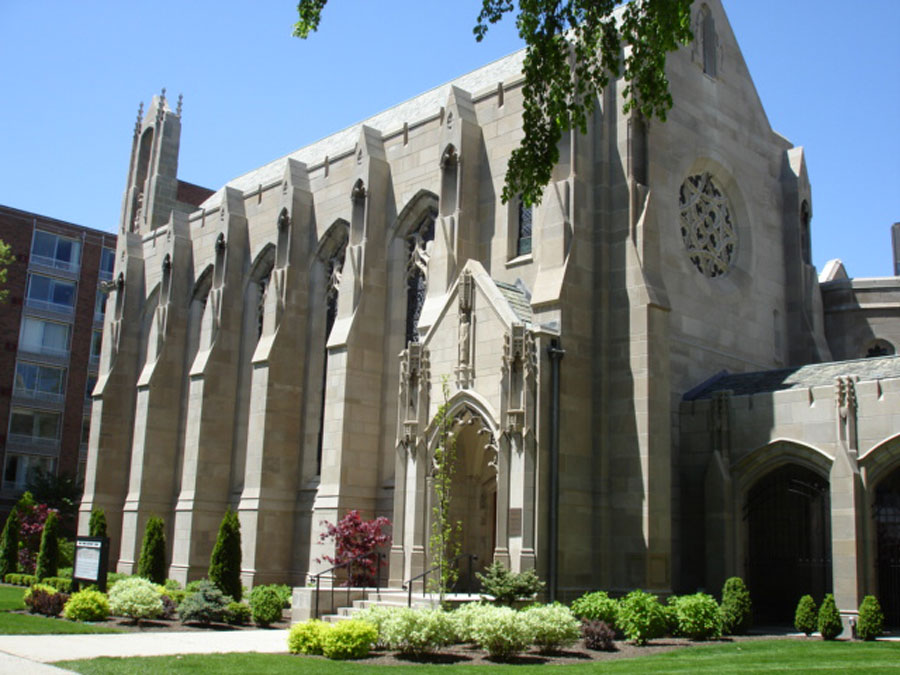First year-round women’s transitional shelter to open on the North Shore
Courtesy First United Methodist Church of Evanston
Daisy’s Place will have a permanent location on the lower level of First United Methodist Church of Evanston. The transitional shelter will have five beds for female-identifying residents.
January 7, 2020
Connections for the Homeless and First United Methodist Church of Evanston have partnered to open Daisy’s Place, a year-round transitional shelter for women.
The shelter will be the first on the North Shore dedicated to housing homeless female-identifying adults, and it is slated to open sometime in 2020. Jennifer Kouba, associate director of development for Connections for the Homeless, said such a shelter would fulfill a “critical need” in the community.
The shelter will have a permanent location in the lower level of the First United Methodist Church, 516 Church St., and it has already been issued a certificate of zoning compliance, according to a news release.
Kouba said both organizations were inspired to found the shelter after Tanuel Major, known as Daisy, was murdered on the steps of First United Methodist Church’s courtyard in November 2018. She noted that while Connections for the Homeless operates Hilda’s Place, a men’s transitional shelter, there is no designated space in the community for homeless women beyond domestic abuse services at YWCA Evanston/North Shore.
“We need to ensure that everyone in our community has a safe place to call home,” Kouba said. “Daisy’s Place is a low-barrier option for women seeking shelter.”
Daisy’s Place will initially accommodate five residents, but aspires to grow long-term. Kouba said she expects the shelter to be fully occupied the day it opens. Daisy’s Place residents will have access to the shelter between 8 p.m. and 8 a.m.
The shelter will provide a light breakfast, beds, showers, laundry and storage, and residents can attend dinner at Hilda’s Place or Evanston Interfaith Action’s soup kitchen seven days a week.
Connections for the Homeless will also provide the shelter’s residents with access to health care, employment and educational support, and mental health services including psychiatric care, according to a news release. A case worker will be assigned to each resident to help secure permanent housing as quickly as possible, but there is no limit to how long a resident can stay at Daisy’s Place.
A news release states that by meeting the needs of homeless shelters’ residents, the likelihood of them obtaining and maintaining permanent housing has historically increased by 60 percent.
Daisy’s Place received a grant from the State of Illinois specifically dedicated to forming a women’s shelter and will also be funded by individual donations, according to a news release. Kouba said it received a “warm welcome” at a December First Ward meeting and from Evanston Mayor Steve Hagerty, as well as from those involved with Connections for the Homeless and the First United Methodist Church.
Mary Taylor-Johnson, director of communications and membership engagement at First United Methodist Church, said the congregants and staff are “excited” about Daisy’s Place. She suggested community members to get involved with Connections for the Homeless or First United Methodist Church through volunteer work and other opportunities.
Taylor-Johnson said when these organizations have a dependable team behind them, they are better equipped to serve the city through additional projects like Daisy’s Place.
“Ending homelessness is going to take a lot more than opening one women’s shelter with a limited number of beds,” Taylor-Johnson said. “But this is a great step forward.”
Email: [email protected]
Twitter: @zoermalin
Related stories:
Woman found dead in alcove of First United Methodist Church in Evanston
Church community gathers to honor woman who died in alcove
Evanston Mental Health Board allocates fiscal year 2019 funds to agencies


